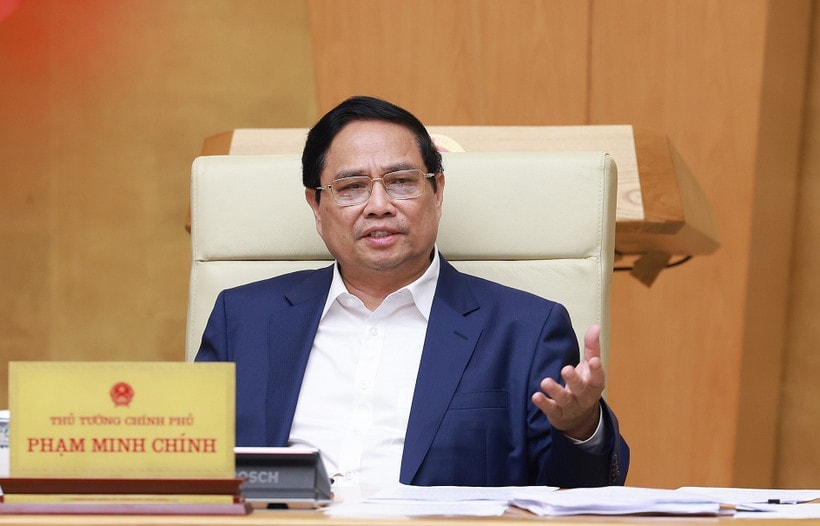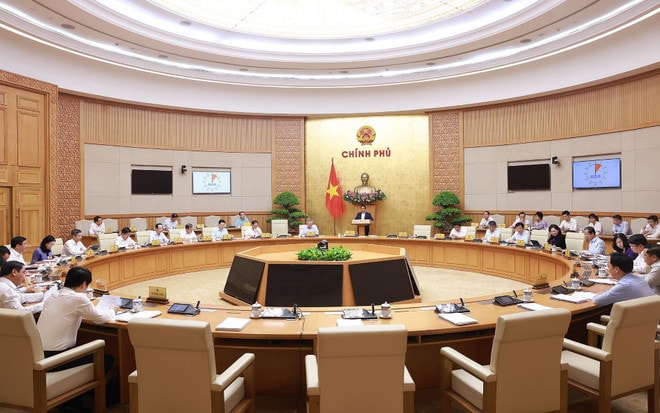Prime Minister urges strengthened decentralisation in law-making
According to the government leader, the laws must be timely, practical, legally sound, and built on real-world needs.

Hanoi (VNA) - Prime Minister Pham Minh Chinh has requested for stronger decentralisation and delegation of power in law-making, shifting from pre-examination to post-inspection mechanisms, and eliminating unnecessary administrative procedures.
Addressing the Government’s law-making session in Hanoi on July 23, the PM stressed the need to end the practice of higher-level authorities merely endorsing subordinate decisions without substantive review.
The session focused on debating some law proposals, verification reports of some bills, and reviewing a number of draft laws, including the Law on amendments and supplements to a number of articles of the Law on Judicial Records and the Law on Drug Prevention and Control, and the replacement draft for the Law on Civil Aviation of Vietnam, the draft Law on E-Commerce, the replacement draft for the Law on Higher Education, and the replacement draft for the Law on Vocational Education.
For the Law on amendments and supplements to a number of articles of the Law on Judicial Records, cabinet members assessed its relevance to a two-tier local administration structure and national digital transformation.
The PM urged reducing administrative procedures and overlaps, referencing international practices, and incorporating expert insights.
Regarding the Law on amendments and supplements to some article of the Law on Drug Prevention and Control, which reclassifies unauthorised drug users as criminals rather than patients, PM Chinh called for a humanitarian approach that protects the rights of juvenile users to education and rehabilitation.

For the replacement draft of the Law on Civil Aviation of Vietnam, delegates highlighted its importance in supporting a growing aviation sector, including state asset oversight, airfare regulation, and air traffic management. PM Chinh emphasised the need to enable the private sector's participation, particularly through public-private partnerships, and to legislate clearly on private-sector involvement in airport development.
Addressing the draft E-Commerce Law, PM Chinh noted its critical role in advancing the Party’s digital transformation policy, while maintaining tax compliance, quality control, and anti-fraud measures. He stressed the need to regulate livestream sales, affiliate marketing, and social media-based commerce to reflect the digital economy's realities.
The draft Laws on Higher Education and Vocational Education drew extensive discussions on governance, admissions, certification, and labour market alignment. The PM called for modern, decentralised education governance, allowing specialised institutions greater flexibility, while assigning infrastructure and staffing responsibilities to capable local bodies.
He underscored linking education with innovation, adapting to emerging disciplines, and rationalising the university network through satellite campuses. The reforms, he said, must align with the Party's resolutions on education reform and support flexible training-employment links.
In his summary, the PM reiterated Party General Secretary To Lam’s directions to resolve institutional bottlenecks within the year, transforming the legal system into a national competitive advantage. He urged ministries to mobilise resources and for ministers to personally lead law-making efforts.
Ministries were directed to review existing laws, enhance decentralisation with resource allocation, and implement strong monitoring. The transition from “pre-examination” to “post-inspection” must involve eliminating redundant intermediaries, particularly top-down rubber-stamping.
According to the government leader, the laws must be timely, practical, legally sound, and built on real-world needs. While stable policies should be embedded in the laws, volatile or rapidly evolving issues should be delegated to the Government or relevant ministries for flexible implementation.
To guide the drafting of the bills, the PM introduced the “five whys” (why to eliminate, refine, add, cut procedures, and decentralise) and the “six clarities” - clear decentralisation and delegation of power, clear principles and roles, clear reduction in procedures, clear translation of the Party's policies, clear anticipated impacts, clear handling of controversial issues.
He further emphasised that legal texts must be concise, precise, understandable, enforceable, and measurable. Drafting bodies were requested to seek feedback from scientists, experts, and the public, incorporate international best practices, and build broad consensus through dialogue./.


